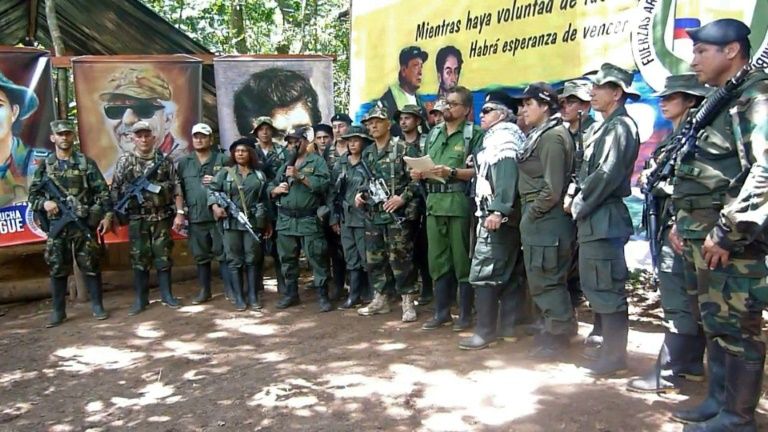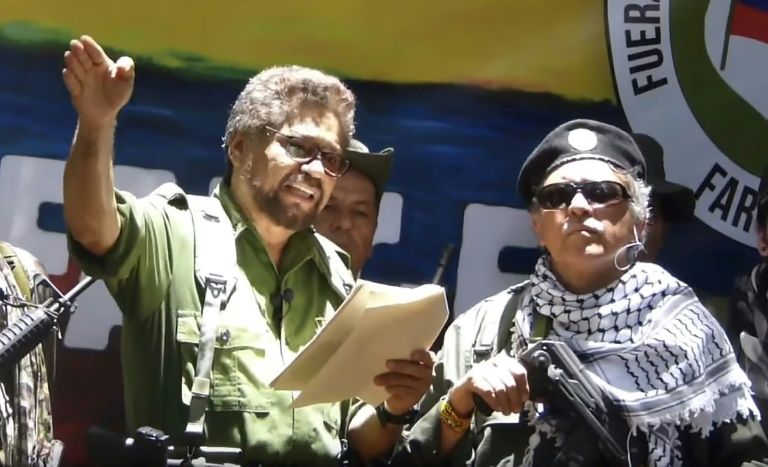Former commander of Colombian rebel group FARC announces resumption of struggle
As Former Colombian rebel leader announces return to arms reported by AFP news agency Hector Velasco, a former senior commander of the Colombian rebel army, the Colombian Revolutionary Armed Forces (Fuerzas Armadas Revolucionarias de Colombia - FARC) Ivan Marquez announced on Thursday [29 August 2019] that he again takes up arms with other partisans who distance themselves from the historic peace agreement signed by the FARC with the Colombian government.
“We are announcing to the world that the second Marketalia has begun,” said Ivan Marquez, dressed in a green military uniform, in a video posted on YouTube, referring to a rural settlement that was considered the site of the FARC in the 1960s.

Former high-ranking commander of the Colombian rebel army Revolutionary Armed Forces of Colombia (FARC) Ivan Marquez announces the resumption of armed struggle with the government of Colombia, 08/29/2019 (c) video frame on YouTube / AFP
Colombian conservative president Ivan Duque replied that he would send a special military unit to track down Marquez and other dissenters, who he said were supported by Venezuelan socialist president Nicolas Maduro.
The Special Peace Process Court (JEP), charged with administering justice for crimes committed during the half-century armed conflict in Colombia, later announced that the arrest warrants for Marquez and others who had been suspended in the peace process have now resumed again .
Marquez accused the government of betraying the hard-won agreement that most of the 7,000 FARCs laid down their arms after a half-century armed conflict.
The whereabouts of Marquez, the number two leader of the FARC Marxist group and its main negotiator at the 2016 peace agreement, has been unknown for more than a year.
“This is a very alarming statement,” said Colombian Government Commissioner for Peace Process Miguel Ceballos.
“This is not surprising for the national government. Unfortunately, these people have already shown clearly with their behavior that they have turned their back on the peace agreement, ”Ceballos said in an interview with Colombian Radio Blu.
In a 32-minute video, Marquez appears in the Colombian jungle surrounded by 17 men and women with rifles. Behind them is a yellow FARC banner.
Marquez stated that the government tricked them into executing the agreement, unilaterally changed its wording and did not provide legal guarantees to former militants, in addition to other government offenses.
All of this, he said, “forced us to return to the field,” Marquez said.
“We were never ideologically defeated. Therefore, the struggle continues, ”said Marquez.
FARC will coordinate its activities with the last rebel group in Colombia, the National Liberation Army, “and those comrades who have not lowered their flags,” he said.
"Special squad"
Colombian President Duke said he ordered the creation of a special military unit “with enhanced intelligence, investigation and mobility capabilities” to track Marquez’s group.
“Colombians must clearly understand that we are faced not with the new guerilla, but with criminal threats from a gang of drug terrorists who have shelter and support from the dictatorship of Nicolas Maduro,” said the President of Colombia.
Duke's comments were supported by Venezuelan opposition leader Juan Guaido, who accused Marquez of using Venezuelan territory and defending Maduro “to threaten our sovereignty” after a telephone conversation with the Colombian leader.
Caracas rejected these allegations when Maduro Diosdado Cabello's right hand said: “What does Venezuela have to do with it?”
Marquez and his fugitive rebel movement colleague Jesus Santrich distanced themselves from the 2016 peace agreement.
Santrich, who went underground earlier this year after the United States tried to extradite him on charges of drug trafficking, also appeared on video.
Although most FARC fighters laid down their arms to return to civilian life, about 2,300 people refused to do so.
According to Colombian military intelligence, these rebels exist mainly due to drug trafficking and illegal mining.
On Thursday, President Duque said the group was hiding its criminal activities under "false ideological clothing."
With United Nations support, the peace agreement ended the rebel struggle of the Colombian Revolutionary Armed Forces (FARC) and turned it into a political party called the United Alternative Revolutionary Forces (Fuerza Alternativa Revolucionaria del Común) using the same abbreviation FARC.
'Hit below the belt"'
Although this peace agreement did not stop the violence in the country — other leftist rebels, right-wing militias and drug dealers are still fighting their battles — it has helped reduce it.
Duque was elected President of Colombia last year with a promise to amend the agreement, which he considers too lenient to former FARC militants guilty of serious crimes.
Meanwhile, the FARC political party condemned the delays in applying the agreement, as well as the lack of legal guarantees and security for its members.
It indicated reports of the killing of 140 former partisans and 31 members of their families since the signing of the agreement.
The new FARC political party, which emerged from the rebel army in accordance with the peace agreement, said it regrets the announcement of Marquez.
Rodrigo Londono, chairman of the FARC party, who spoke during the war under the pseudonym Timoshenko [in honor of the Soviet Marshal - bmpd], called Marquez’s performance a “weak move”.
Londo said most FARC former fighters still believe in a peace agreement. But others hesitate and can buy into what Marquez does, Londono said.
“It could hurt us,” he said on Colombian radio.
Former Colombian President Juan Manuel Santos, who received the Nobel Peace Prize for reaching a peace agreement with the FARC, defended the agreement and insisted that most former FARC members still believe in it.
“We must be cruel to the deserters. The battle for peace does not stop, ”wrote Santos.

https://bmpd.livejournal.com/3757000.html




